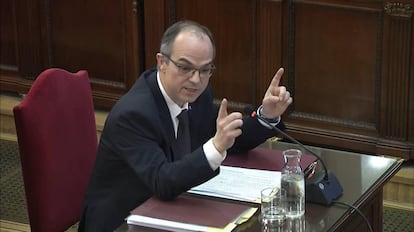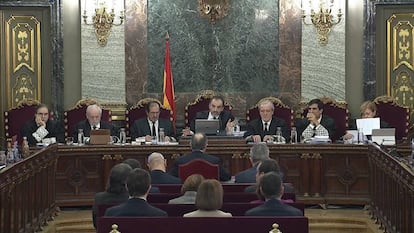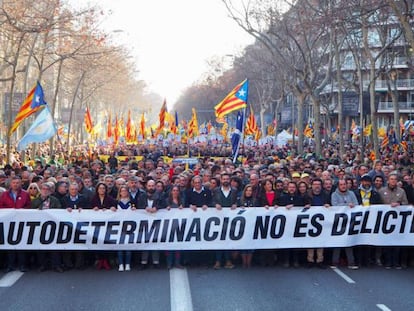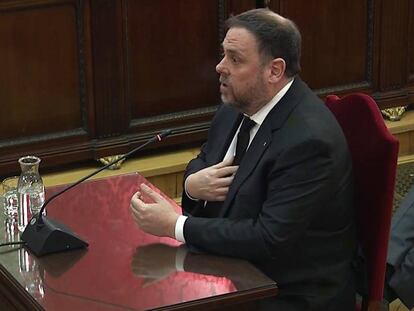Catalan independence was ¡°a political declaration,¡± says ex-official at Supreme Court trial
Jordi Turull argues that the regional government did not encourage violence, nor did it use public money to hold the unauthorized independence referendum of October 1

The unilateral independence declaration made inside the Catalan parliament in late October 2017 was ¡°a political declaration,¡± according to a defendant at the ongoing trial of separatist leaders at Spain¡¯s Supreme Court.
Jordi Turull, who served as head of presidential affairs when the region held an unauthorized referendum, told the court that Catalan officials sought to find ¡°a balance between observing the law¡± and ¡°[our commitment to] citizens.¡± He said that 80% of Catalan society wants to vote on the future of Catalonia.
If there is political will, it is possible to find a way
Jordi Turull, ex-Catalan government spokesman
¡°Was the independence declaration a formal declaration?¡± asked public prosecutor Jaime Moreno. ¡°It was a political declaration,¡± replied Turull. ¡°It was the expression of a political will that fits in with the majority feeling of the people of Catalonia.¡± Opinion surveys consistently show Catalan society split on the issue of independence, and separatist parties have always fallen short of 50% of the vote at regional elections.
Turull and 11 other former Catalan government and civil society leaders are on trial for crimes ranging from rebellion to sedition, disobedience and misuse of public funds in connection with the referendum of October 1, 2017 and the unilateral independence declaration made by separatist parties inside the regional parliament on October 27.
Former Catalan premier Carles Puigdemont, who fled Spain to avoid arrest right after the declaration, said on Tuesday that Turull¡¯s statements in court had been ¡°spectacular.¡± ¡°His decision to stand firm against the public prosecution should elicit shame in those who unleashed an indecent repression,¡± he tweeted from Belgium, where he currently resides.
En @jorditurull ha estat espectacular, la seva fermesa i la decisi¨® de plantar cara a la fiscalia hauria de provocar la vergonya general de tots els qui han desfermat una repressi¨® indecent. Gr¨¤cies per la teva fermesa!
— Carles Puigdemont (@KRLS) February 19, 2019
Unlike the first defendant to take the stand last week, ex-deputy premier Oriol Junqueras, Turull agreed to answer questions from the public prosecution. But he refused to accept those posed by the lawyer for Vox, a far-right party that is acting as a private prosecution in the case.
Turull, who was in charge of the logistics of the referendum, admitted that the Constitutional Court had ruled that the vote should be halted. He said that the Catalan government tried to negotiate with Madrid but was met with refusal, and ultimately made ¡°a well-thought-out¡± decision to press ahead with plans on the basis of a ¡°citizen mandate.¡±
The former official, who faces 16 years in prison on charges of misuse of public funds and rebellion, underscored that the Catalan government did not spend one euro of public money to organize the vote, and that he never supported violence ¨C a key element in determining whether there was rebellion or not.

The prosecution believes that acts of violence took place on September 20, when civil society leaders encouraged a crowd to congregate outside the Catalan department of economic affairs, where a police raid was taking place in search of referendum material. Police cars were vandalized and court officials were forced to exit the building through the roof.
The public prosecutor was followed by the solicitor general Rosa Mar¨ªa Seoane, who followed a similar pattern of questioning about the Constitutional Court¡¯s decisions, the cost of the referendum, the events of September 20 and the independence declaration.
Turull said that separatist politicians explored ¡°all the possibilities of the legal framework to find a way to exercise the right to self-determination,¡± and insisted that ¡°if there is political will, it is possible to find a way.¡±
The high-profile proceedings at the Supreme Court have been cast as a political trial by the pro-independence movement, while Spain has launched an international campaign to defend the impartiality of the Spanish judiciary.?
S¨¢nchez at the Senate
At a debate in the Senate on Tuesday, Prime Minister Pedro S¨¢nchez of the Socialist Party (PSOE) told senators for the Catalan Republican Left [ERC] that ¡°you never wanted dialogue. You are much better off with a Popular Party [PP] government in Madrid.¡±
S¨¢nchez has called a snap general election for April 28 after failing to secure congressional backing for his 2019 budget plan. The Socialist leader had been hoping for support from the Catalan separatist parties, but they made demands that the PM refused to accept, including a referendum on independence and moves in favor of the 12 defendants on trial.
When he reached power in early June through a no-confidence vote supported by these same parties, S¨¢nchez pledged to improve relations with Catalonia following a complete breakdown under the previous administration of Mariano Rajoy, of the PP, who suspended regional self-rule for seven months.
The new leader of the PP, Pablo Casado, has pledged that if he becomes the next prime minister of Spain he will immediately revoke Catalan self-rule again.
Former Prime Minister Mariano Rajoy to appear in trial
The politicians who will be testifying in the Supreme Court trial of the leaders of the Catalan pro-independence drive will be called to the stand in the early part of the three-month hearings, thus leaving some time between their high-profile testimonies and the general election that was recently called for April 28.
Among those who will be giving evidence are former Popular Party Prime Minister Mariano Rajoy, his former deputy prime minister, Soraya S¨¢enz de Santamar¨ªa, ex-Finance Minister Crist¨®bal Montoro, and one-time Catalan regional premier Artur Mas. These witnesses are due to appear in court from February 26 to 28.
Spanish law dictates that witnesses called by the prosecution will be the first to appear, starting with those requested by the public prosecutor. In this particular case, the state attorney has called a dozen or so former high-ranking officials from the Interior Ministry and from the Catalan regional government, including the former secretary of state for security, Jos¨¦ Antonio Nieto, and the former central government delegate in the region, Enric Millo.
The rest of the witnesses called by the public prosecutor are mostly members of the National Police, the Civil Guard and the Catalan regional police force.
English version by Susana Urra.
Tu suscripci¨®n se est¨¢ usando en otro dispositivo
?Quieres a?adir otro usuario a tu suscripci¨®n?
Si contin¨²as leyendo en este dispositivo, no se podr¨¢ leer en el otro.
FlechaTu suscripci¨®n se est¨¢ usando en otro dispositivo y solo puedes acceder a EL PA?S desde un dispositivo a la vez.
Si quieres compartir tu cuenta, cambia tu suscripci¨®n a la modalidad Premium, as¨ª podr¨¢s a?adir otro usuario. Cada uno acceder¨¢ con su propia cuenta de email, lo que os permitir¨¢ personalizar vuestra experiencia en EL PA?S.
?Tienes una suscripci¨®n de empresa? Accede aqu¨ª para contratar m¨¢s cuentas.
En el caso de no saber qui¨¦n est¨¢ usando tu cuenta, te recomendamos cambiar tu contrase?a aqu¨ª.
Si decides continuar compartiendo tu cuenta, este mensaje se mostrar¨¢ en tu dispositivo y en el de la otra persona que est¨¢ usando tu cuenta de forma indefinida, afectando a tu experiencia de lectura. Puedes consultar aqu¨ª los t¨¦rminos y condiciones de la suscripci¨®n digital.










































